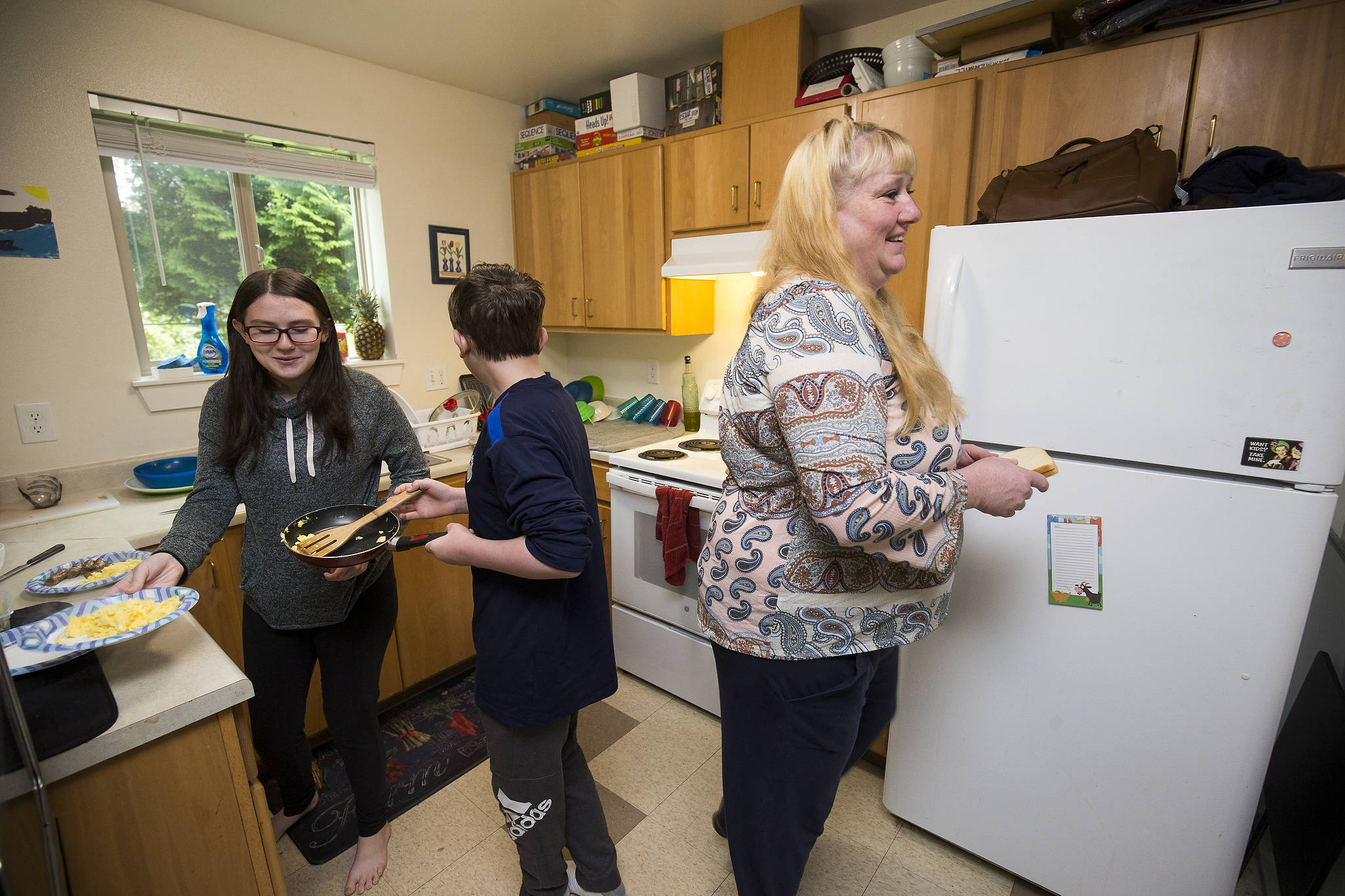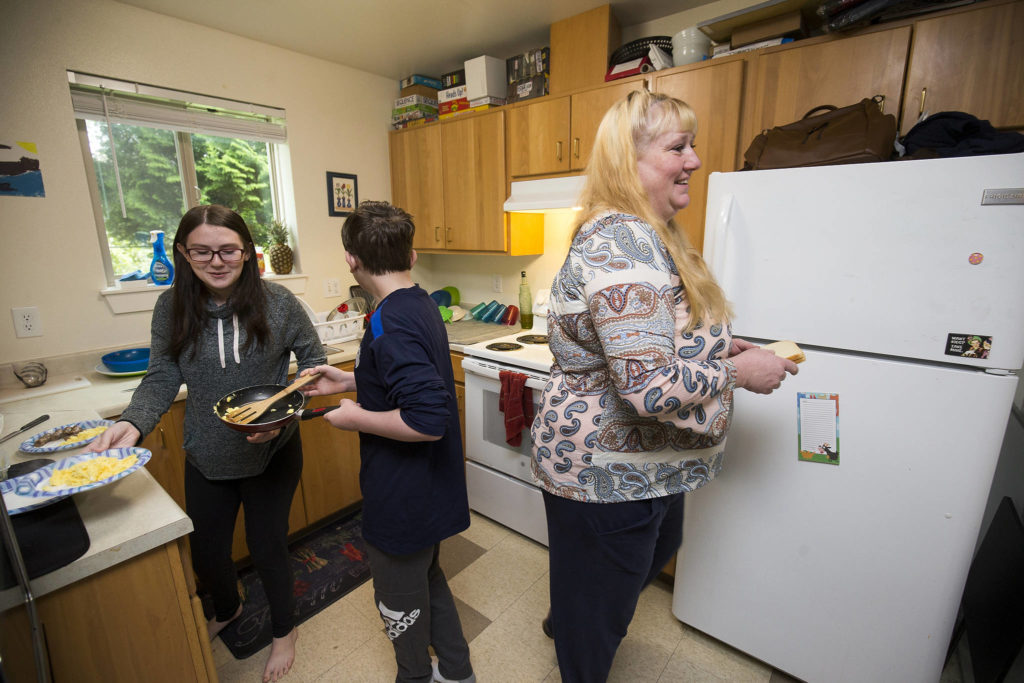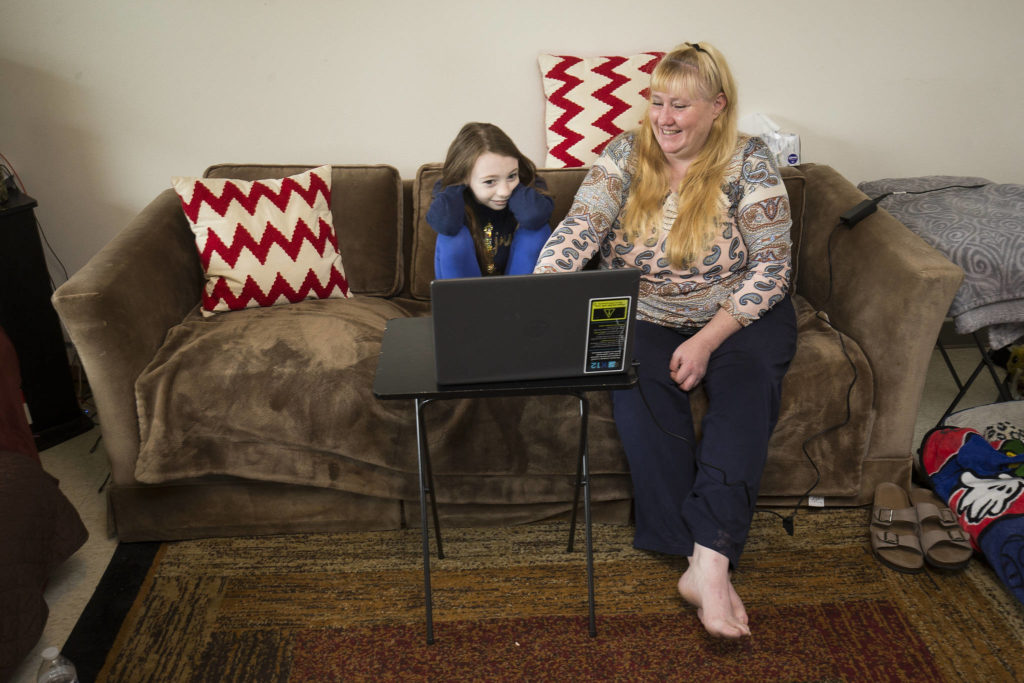EVERETT — Families in need of a pick-me-up can expect some support soon, if they choose to accept it.
In mid-July, the IRS will begin making advanced payments of the Child Tax Credit. Families who qualify can receive up to $300 a month — $3,600 for the 2021 tax year — for each child under the age of 6. They also can receive as much as $250 a month — $3,000 total — for each child 6 to 17 years old. Previously, the tax credit maxed out at the end of the year at $2,000 for each child under 17.
For some cash-strapped families, the front-ended payments will help bridge the gap as they try to regain their footing in a workforce taking baby steps out of the pandemic.
The deposits are expected to hit bank accounts on July 15 and continue through December, with as much as 50% of the Child Tax Credit paying out in preliminary installments.
Heather Adams, 45, did a double-take when learning of the new payouts. The single mother of three said she couldn’t believe more assistance was on the way after the numerous rounds of stimulus checks.
The expected additional $750 each month was overwhelming news, Adams said.
“It was just kind of a relief, honestly, like, ‘Oh, I don’t have to stress for the last six months of the year,’ because I’ll have a little extra income,” she said. “That took a big load of stress off me.”
The Adams family of four — Heather, and three kids, Kiara, 15, Matthew, 13, and Phoenix, 10 — lives in a Housing Hope townhome in Arlington. After moving in just weeks before the pandemic, their housing quickly became a classroom with the kids’ switch to online learning.
Unanticipated costs were quick to follow, Adams said.
The food budget increased as the kids’ two free meals a day from the school cafeteria vanished. The Wi-Fi bill swelled six-fold as Adams upgraded her plan to meet the needs of homeschooling on three different laptops. Not to mention the purchase of a printer, ink and paper to print the kids’ worksheets. Or when stores ran out of necessities last spring, and even a roll of toilet paper meant spending extra.
Adams praised her children for earning good grades, but homeschooling hasn’t been easy. Two of her kids have learning disabilities that make focusing difficult, and motivation has waned as the pandemic persisted.
“Having to stay home and re-learn fourth-, eighth- and ninth-grade work, so I can help them succeed, takes up most of my day,” she said. “It’s like becoming a teacher overnight. It’s a full-time job at home.”
Unable to work as she juggles the kids’ school, and unsure when or where she’ll be able to find a job, Adams said the tax credit won’t go to waste.
“This year, desperately, I need it this year, because of all the loss that happened.”
As a habitual saver, Adams said, the regular lump-sum payment after tax season ends up stashed in her bank account for a rainy day.
The preliminary installments will help solve some of the family’s immediate needs, including affording the costs of an upcoming move and funding the transition back to school. After more than a year of virtual learning, Adams expects the costs of school clothes and supplies to hit hard.
Adams appreciates the flexibility in the Child Tax Credit, and she said staggered monthly payments will help her greatly, but the traditional payout might be better for others.
The IRS said it will soon have an option to forego the early payments if the lump sum is preferable.
Not all will be eligible for the benefits. Increased payouts are phased out for married taxpayers filing a joint return over $150,000, heads of households earning north of $112,500 and all other taxpayers making more than $75,000.
In a Daily Herald Facebook post asking for thoughts on the tax credit, some commenters shared opposition to the benefit. Remarks included opinions that the pandemic is over, making the advancement unnecessary; others believed they’d have to pay the money back or were frustrated they couldn’t yet opt out of the payouts.
Amid the criticisms, some folks said it would be a lifeline.
Single-father Doug Warren, of Lake Stevens, said any extra income helps when raising his two daughters.
After being laid off from his job in the printing industry last March, a week into the pandemic, Warren stayed home to take care of his children, 13 and 4. His youngest child has special needs and a breathing disorder that put her in the high-risk category for COVID-19, so the family hunkered down.
“I couldn’t put my daughter into a day care situation, so thankfully the unemployment benefits have helped us survive,” Warren said in an email.
The extended unemployment and stimulus payments have kept his family off the streets, Warren said. Money goes to the necessities: rent, utilities, food and clothes for the growing kids.
“I was careful with spending before the pandemic, but this past year has been an exercise in frugality,” Warren said. The extra money from the Child Tax Credit “is going to help us greatly just to make ends meet.”
Despite the vaccine rollout, the pandemic won’t feel over for Warren until his 4-year-old is protected against the virus. Until then, he said, the family is maintaining its bubble and using curbside pickup for all purchases.
Warren said the pandemic isn’t all woes. It has strengthened his family’s bond, and he’s used the time to write a children’s book that will be published later this year.
“Every cloud has a silver lining, right?” he said.
Chelsea Roehm, 28, and her husband, Keenan, of Everett, became parents during the pandemic.
After selling her mobile coffee truck weeks before the pandemic hit, Roehm spent the year at home with the newborn. Money was a little tight and finding someone to watch the baby while staying away from folks was a challenge, Roehm said. She had to find a job she could work from home.
Stimulus checks went to pay hospital bills, and the Child Tax Credit will help the Roehm family make day-to-day purchases.
“It is going to be nice to stock up on diapers and stuff,” she said. “We are OK, we are not struggling, it is still nice, but I can’t imagine the people that definitely need the help.”
Roehm said she has friends in more dire situations as they juggle raising multiple kids, working and attending school. The advanced payouts will provide immediate assistance, as opposed to waiting until next year for a lump sum.
“I’d love to have (the monthly payouts) instead of waiting all year for the few thousand,” Roehm said. “When it’s just monthly, it helps with people in poverty, so I think it is great.”
Talk to us
> Give us your news tips.
> Send us a letter to the editor.
> More Herald contact information.



























